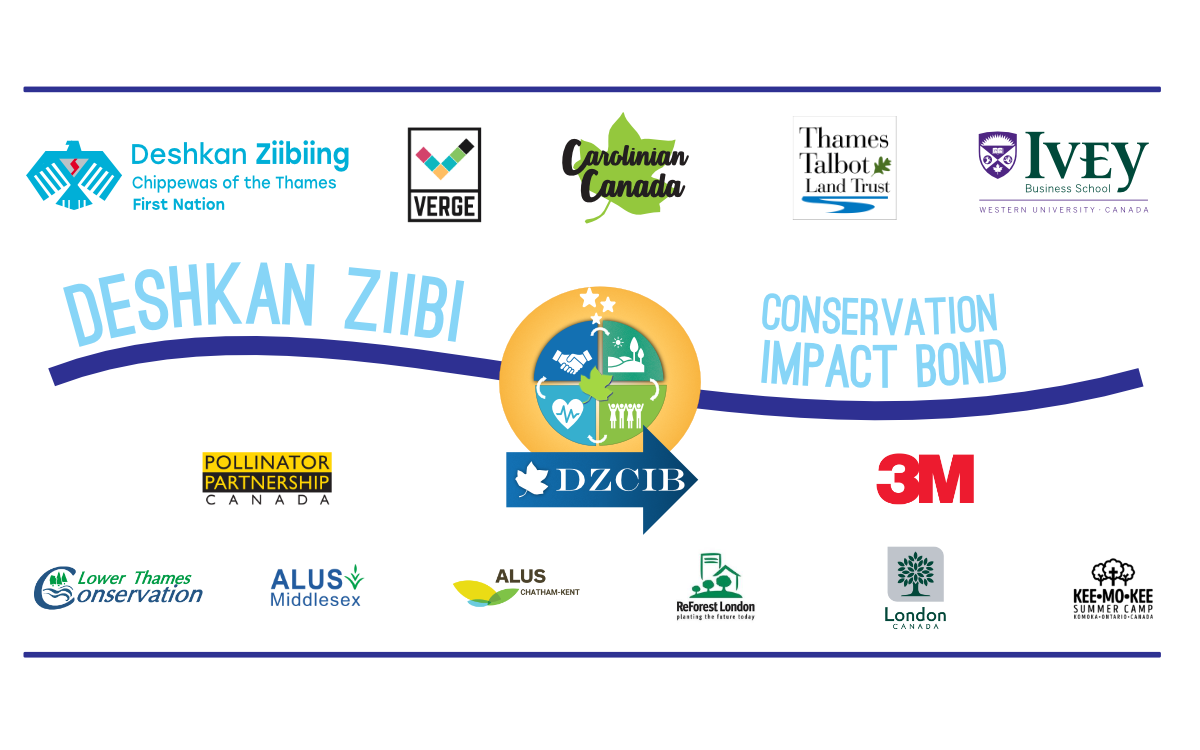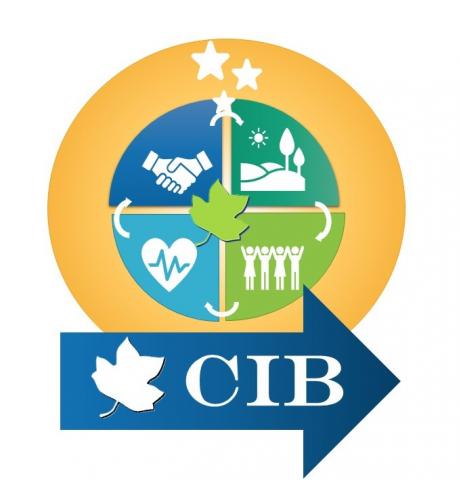“The name Deshkan Ziibi comes from the original Anishinaabemowin name given to the Thames River which translates to “antlered or horned river.” It’s important to take time to build relationships, to listen, to learn and eventually trust one another when embarking on collaborative work. Indigenous people have been stewarding the land on the Turtle Island since time immemorial and its imperative the conservation sector begins to acknowledge and work with Indigenous nations who hold vital knowledge on maintaining and revitalizing local ecosystems.”
- Emma Young, Deshkan Ziibiing Senior Environmental Officer
One of the first of its kind in the world, the Deshkan Ziibi Conservation Impact Bond (DZCIB) financing model was conceived to mobilize increased capital toward reversing the trend of habitat loss and accelerating the growth and long-term stewardship of healthy landscapes. Groups and individuals can invest for monetary returns or environmental gains. Developed and launched in 2020 by the DZCIB Leadership Team consisting of Deshkan Ziibiing (Chippewas of the Thames First Nation), VERGE Capital, Thames Talbot Land Trust, Ivey Business School and Carolinian Canada Coalition, with the support of 3M, Phase 1 is the first step towards a goal of improving 400 ha / 1,000 acres of Ontario’s Carolinian Zone. Located between Toronto and Windsor, this area represents Canada's most complex and fragile ecoregion, and is home to many Indigenous Nations, some of the country’s most diverse flora and fauna, and approximately 25% of Canada’s human population.

DZCIB marks the successful launch of a pilot that is being scaled out in southern Ontario to protect one-third of Canada’s rare and endangered wildlife; drinking water for 11 million people; and a sustainable way of life for 25% of Canadians who live here.
As of July 2021, the DZCIB pilot has supported 53 healthy landscape projects in the Deshkan Ziibi region resulting in numerous ecological, sociocultural, and economic benefits. 69 hectares (171 acres) of habitat in southern Ontario have been improved, 39,000+ native plants have been planted, and approximately 450 people have been engaged in high-quality learning and activities on the land.
For a visual representation of the DZCIB pilot project check out this storymap here.

Nature Based Services: Get Involved in Phase 2
We recognize each business needs are unique. Our team provides scientific, economic and localized expertise to identify, evaluate, and manage natural assets in financial planning and business management programs.
We use a pay-for-success model. This means we fund the project delivery and you only pay for tangible results.
Visit NatureBasedServices.ca to get involved.
The DZCIB Report
The Deshkan Ziibi Conservation Impact Bond Project: On Conservation Finance, Decolonization, and Community- Based Participatory Research
The Ivey Business School report, which was co-funded by the Smart Prosperity Institute, examines and evaluates principles of the DZCIB model from a conservation finance perspective. The report establishes five evaluation pillars that stand as guideposts for projects on the landscape and aim to track holistic impact including (1) connecting healthy habitats, (2) connecting opportunities, (3) connecting knowledge/circling and learning, (4) connecting our hearts and minds, and (5) connecting our bodies.
You can download the report in part here.
Conservation Impact Bond
The CIB model is a “pay-for-success”, outcome-based conservation finance instrument. The core financial model is based on bringing together entities that place a tangible, monetary value on a service provided by nature and are willing to pay to ensure this service continues (“outcome payers”) with investors willing to invest upfront in these conservation outcomes (“impact investors”).
A healthy landscape portfolio of on-ground projects is co-developed and led by Carolinian Canada’s network of diverse landowners and leaders who protect, steward and grow healthy habitat (“habitat growers”). They include Indigenous, business, agriculture and non-profits who have deep local knowledge and experience to support thriving, resilient working landscapes. Project portfolios apply standards to improve local natural assets and advance United Nations Sustainable Development Goals in the spirit and practice of reconciliation.
Impact investors will receive back their principal plus a monetary return on investment if the agreed upon outcomes from the healthy landscape portfolio are achieved. The pay-for-success model allows outcome payers (e.g. public agencies, foundations or companies benefiting from sustainability) to achieve environmental and sociocultural benefits while simultaneously decreasing their risk, accelerating action and driving innovation, efficiency, and effectiveness through the project implementation. This model allows private finance to flow into public-good projects and be rewarded if the program is successful.


